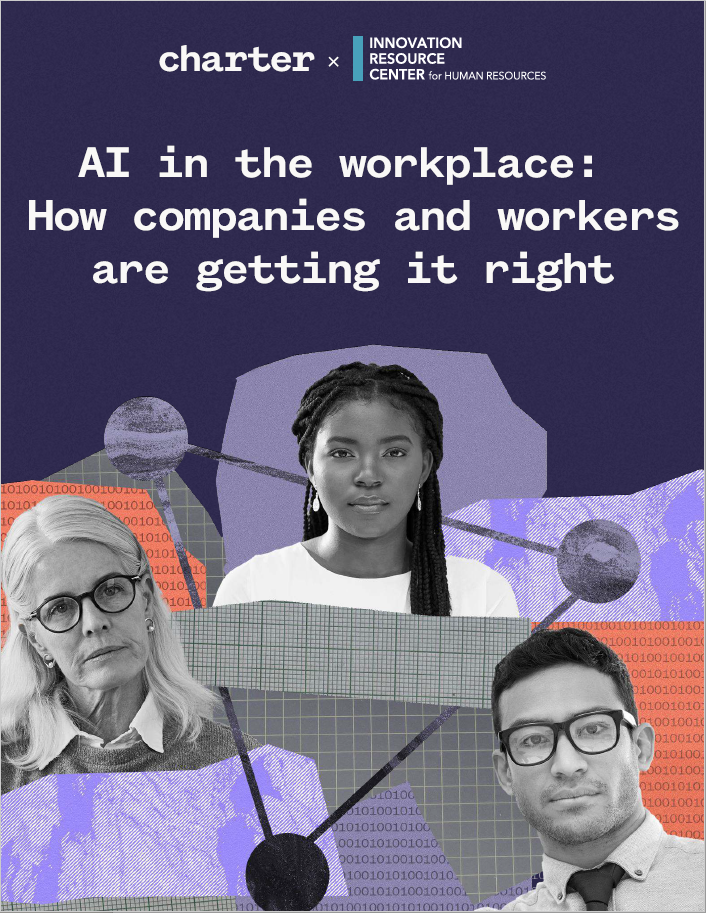About this IRC® + IRC4HR® Project
In their recently-published study – Using AI in ways that enhance worker dignity and inclusion – the research team from Charter authored a “playbook” for workers, HR practitioners, policy-makers, and all leaders to help them make decisions that will support a just transition to AI in the workplace.
Among the findings in the playbook is the importance of worker voice in the successful deployment of AI. As is the case with most technology in the workplace, workers are typically best positioned to help identify promising use cases, to determine how new technology will impact their workflow, and to assess how new technology will impact product and service quality. In short, companies benefit more from technology — and the jobs of workers are also enhanced — when input is provided by the people who use it in their day-to-day work since they are “experts at their own jobs.”
In the months since the playbook was published, there has been continued discussion by employers, policymakers, researchers, and technologists about the implications for the workforce and how to better involve workers in the use of AI. To provide further guidance and direction to employers, IRC4HR funded another grant for the Charter research team to identify and spotlight promising examples and cases of companies that are models for including worker voice in the planning, design, and implementation of AI.
In their newly published (May 2024) guide, AI in the workplace: How companies and workers are getting it right, readers of the material will find:
- Examples of worker involvement (addressing questions including “who should be at the table?”) from a range of industries and organizational sizes
- Design process and work design considerations
- Sequencing and steps for work plans
- Cautionary tales and “watchouts” to avoid wasted time and team frustration
- Real on-the-ground case studies to provide insights and confidence into approaching AI usage with worker interests prioritized
We are excited about this important follow-up research and are confident that you will, once again, find the findings insightful and practical.
Here are some key takeaways from the Charter research team:
1️⃣ It’s early. Even leading tech companies are in the early stages of adoption. Where we expected to find highly developed blueprints, we mostly see experimentation and nascent routines.
2️⃣ Qualitative impact is sometimes more visible than quantitative. At companies developing proprietary tools, we are seeing collaborative creation, internal user testing, and iterative design processes that more organizations would benefit from using.
3️⃣ The companies that encourage employee experimentation are going further, faster. This comes in many forms: hosting staff hackathons, offering access to tools like ChatGPT Plus and Gemini, and creating space for show-and-tell sessions. I especially appreciate one company’s “AI after-school club” and another’s “AI Inspiration and Adventures” Slack channel.
4️⃣ Leader-led and employee-developed approaches must co-exist. Asana, for example, balances “broad-based experimentation” and information sharing with leader-led objectives. Accenture has introduced a Proposal Builder tool with significant input and ongoing testing from writers who use the tool to create sales materials.
Feel free to share your name and email address in our “Contact Us” form to be kept informed about this and other research. And if you find the work valuable, or would like to share any feedback, please let us know!
Project page image by Tumisu from Pixabay
Researchers

Emily Goligoski
Emily Goligoski is the Head of Research at Charter Works, Inc. She previously directed audience research at The Atlantic, served as research director for the Membership Puzzle Project at New York University, and led user experience research for The New York Times newsroom. She holds a Master’s Degree in Learning, Design, and Technology from Stanford and is an adjunct professor at Columbia Graduate School of Journalism.

Jacob Clemente
Jacob is a reporter at Charter Pro, primarily covering AI in the workplace. Prior to Charter, Jacob was a researcher at the Freakonomics Radio Network, and a research assistant for historian Chris Miller, author of Chip War, and business school professor Michael Porter.

